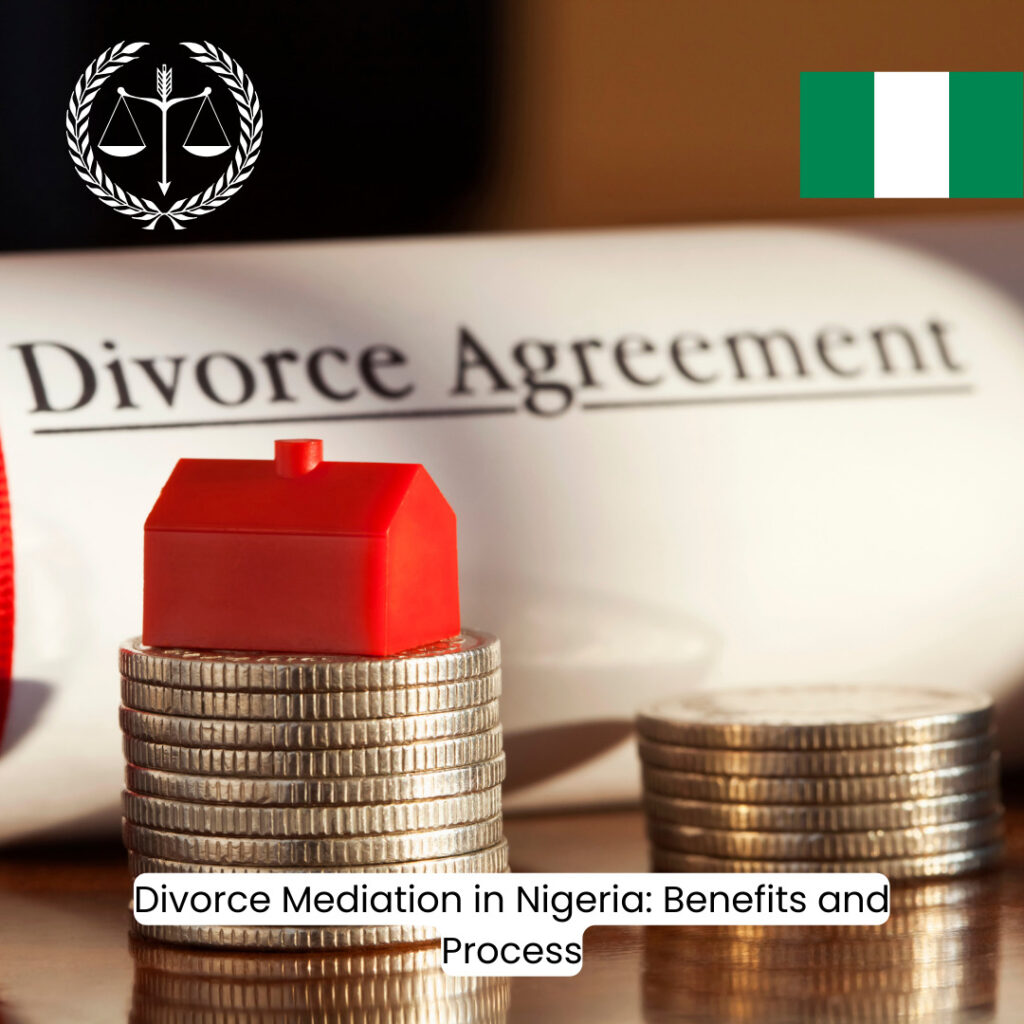Divorce Mediation in Nigeria: Benefits and Process
Divorce is a significant life event that can be emotionally and financially taxing. In recent years, alternative dispute resolution methods have gained popularity as a way to navigate the complexities of divorce more amicably and efficiently. One such method that has gained traction in Nigeria is divorce mediation. This article delves into the benefits of divorce mediation and outlines the mediation process in the Nigerian context.

Understanding Divorce Mediation
Divorce mediation is a voluntary and confidential process in which a neutral third party, known as a mediator, assists divorcing couples in reaching mutually acceptable agreements on various issues, such as property division, child custody, spousal support, and more. Unlike litigation, which involves courtroom battles, divorce mediation fosters open communication and collaboration between spouses.
Benefits of Divorce Mediation
1. Maintaining Control:
One of the primary advantages of divorce mediation is that it allows couples to maintain control over the outcome of their divorce. Rather than having a judge make decisions for them, couples work together to create agreements that reflect their unique needs and preferences.
2. Cost-Effectiveness:
Mediation is often more cost-effective than traditional litigation. The process typically involves fewer legal fees, as the focus is on resolving issues through negotiation rather than lengthy court proceedings.
3. Reducing Emotional Strain:
Divorce can be emotionally draining, but mediation provides a less adversarial environment. Couples have the opportunity to express their concerns, needs, and viewpoints in a constructive manner, potentially reducing the emotional toll of the process.
4. Faster Resolution:
Mediation tends to be faster than court proceedings. Couples can schedule mediation sessions at their convenience, leading to quicker resolutions and allowing them to move forward with their lives sooner.
5. Preserving Relationships:
Particularly important for couples with children, mediation focuses on finding solutions that prioritize the best interests of the family. This approach can help maintain healthier post-divorce relationships, which is crucial when co-parenting.
The Divorce Mediation Process in Nigeria
The divorce mediation process in Nigeria follows a structured path that aims to guide couples through a series of discussions to reach agreements. While the exact process may vary based on individual circumstances, the following is a general overview:
1. Initiation:
The process begins when either spouse expresses interest in mediation. They may approach a mediation center or engage a qualified mediator to facilitate the proceedings.
2. Mediator Selection:
Couples typically choose a mediator collaboratively. A mediator should be impartial, well-versed in family law, and experienced in guiding discussions.
3. Initial Meetings:
The mediator meets separately with each spouse to understand their perspectives and gather essential information. This allows the mediator to identify areas of agreement and disagreement.
4. Joint Sessions:
Joint mediation sessions commence, during which both spouses, along with the mediator, discuss various issues. These sessions encourage open communication and negotiation.
5. Issue Resolution:
Through facilitated discussions, couples work together to find common ground on matters such as property division, child custody, visitation schedules, and spousal support.
6. Drafting Agreements:
As agreements are reached, the mediator assists in drafting legally binding documents that outline the terms of the settlement. These agreements are reviewed by both parties and, if needed, legal advisors.
7. Legal Review and Finalization:
Once the agreements are in place, it’s advisable to have legal advisors review the documents to ensure their legality and fairness. Subsequently, the agreements can be submitted to the court for approval.
Tips for Successful Divorce Mediation
For a successful divorce mediation experience in Nigeria, consider the following:
Choose a Skilled Mediator: The mediator’s expertise is paramount. Look for someone who is knowledgeable about Nigerian family law and has a track record of successful mediation.
Be Prepared: Come prepared to discuss your concerns, priorities, and goals. Having a clear understanding of what you want to achieve can streamline the mediation process.
Practice Open Communication: Effective communication is key. Listen actively to your spouse’s viewpoints and express your own thoughts and concerns constructively.
Stay Focused on the Future: While emotions may run high during mediation, keep your focus on the future and the best interests of everyone involved.
Be Willing to Compromise: Mediation involves give-and-take. Be open to compromising on certain issues to achieve a balanced overall settlement.
Conclusion
Divorce mediation offers an opportunity for couples in Nigeria to navigate divorce in a less adversarial and more cooperative manner. By emphasizing open communication, collaboration, and customized agreements, mediation can lead to outcomes that better meet the needs of both spouses and their families. Through its benefits of cost-effectiveness, reduced emotional strain, and preservation of relationships, divorce mediation has the potential to pave the way for a more peaceful transition into post-divorce life.